41 parts of the leaf labeled
Parts Of A Leaf || Simple Leaf And Compound Leaf - EcoBioHub In this respect, the leaf is a partial stem or branch having limited growth. They are green in colour always follow an acropetal order of development and are exogenous in origin. PARTS OF A LEAF (TYPICAL) (02) Leaf stalk (or Petiole) (03) Leaf-blade (or Lamina) PHYLLOTAXY OF LEAVES (02) Opposite Phyllotaxy (03) Whorled or Verticellate Phyllotaxy leaf | Definition, Parts, & Function | Britannica Typically, a leaf consists of a broad expanded blade (the lamina ), attached to the plant stem by a stalklike petiole. In angiosperms leaves commonly have a pair of structures known as stipules, which are located on each side of the leaf base and may resemble scales, spines, glands, or leaflike structures.
Parts Of A Leaf Label Worksheets & Teaching Resources | TpT 61. $1.50. PDF. Knowing so many parts of the flower can be confusing for students. This practice sheets has students labeling the basic parts of a plant and the inner parts of the flower. Students will have to label the following: ♦ roots ♦ leaves ♦ stem ♦ petals ♦ sepals ♦ stamen ♦ stigma ♦ pistil -embryo Als.
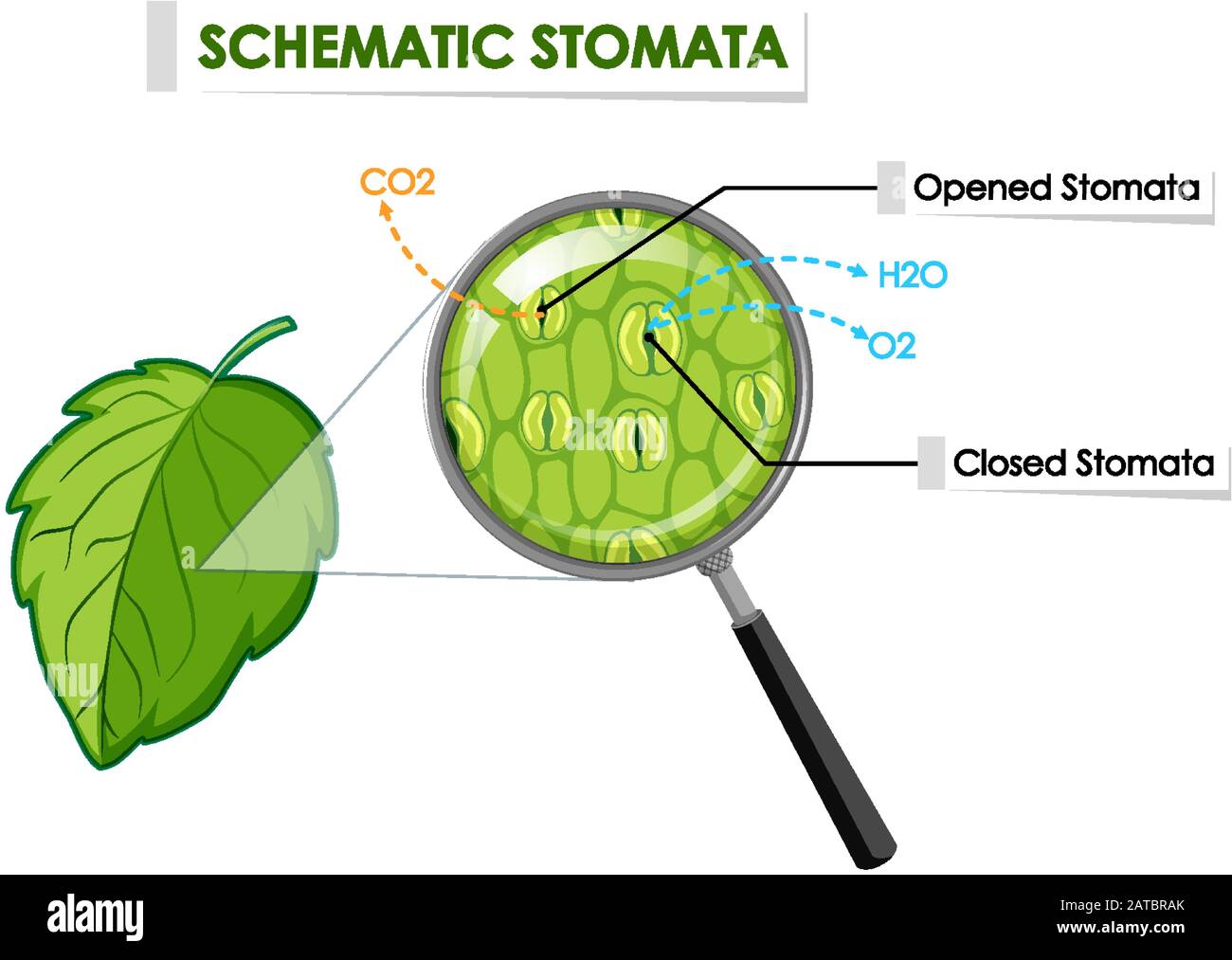
Parts of the leaf labeled
Leaf: Definition, Parts and Types (With Diagram)| Botany A leaf made up of two or more leaflets, e.g., pea, and several other members of Leguminosae. The compound leaves may be of several types. They are as follows: A. Palmately compound Leaf: (i) Unifoliate: Having one leaflet only, e.g., Citrus. (ii) Bifoliate: Palmate compound leaf with two leaflets, e.g., Prinsepia, Balanites. (iii) Trifoliate: Internal Structure of Leaf: Parts, Function, Diagram - Embibe The anatomy or internal structure of dicot leaves can be understood on the basis of the following structures: 1. Upper Epidermis 2. Mesophyll a. Palisade Tissue b. Spongy Tissue 3. Vascular Tissue 4. Midrib 5. Lower Epidermis Upper Epidermis 1. The upper epidermis is made up of a single layer of parenchymatous cells. 2. Leaf Structure and Function | Harvard Forest The internal tissues consist of the mesophyll, the photosynthetic cells of the leaf. These are typically the long columnar cells nearer the surface (palisade parenchyma) and the looser irregular cells beneath (the spongy mesophyll parenchyma). These cells are loaded with chloroplasts in the cytoplasm.
Parts of the leaf labeled. How to draw leaf 🍃 diagram and label the parts easy - YouTube here I have drawn a diagram of a leaf and labeled the parts of it . If it is helpful for you please like , share and subscribe .for more videos please subscr... Mediagazer 2 days ago · Mediagazer presents the day's must-read media news on a single page. The media business is in tumult: from the production side to the distribution side, new technologies are upending the industry. Stencil - Wikipedia Stencilling produces an image or pattern by applying pigment to a surface under an intermediate object with designed gaps in it which create the pattern or image by only allowing the pigment to reach some parts of the surface. The stencil is both the resulting image or pattern and the intermediate object; the context in which stencil is used makes clear which meaning is intended. Anatomy of a Leaf, Use These Leaf Parts to Identify a Tree - Treehugger Epidermis - The leaf's outer layer and protective "skin" surrounding leaf tissues. Cuticle - A waxy protective coating on the leaf epidermis that prevents water loss on leaves, green stems, and...
Plant Leaves and Leaf Anatomy - ThoughtCo Blade - broad portion of a leaf. Apex - leaf tip. Margin - leaf edge boundary area. Margins can be smooth, jagged (toothed), lobed, or parted. Veins - vascular tissue bundles that support the leaf and transport nutrients. Midrib - central main vein arising from secondary veins. Base - area of the leaf that connects the blade to the petiole. Parts of the Grape Vine: Flowers and Fruit – Grapes - Extension Jun 20, 2019 · The period of time during which flowers are open (the calyptra has fallen) is called bloom (also flowering or anthesis), and can last from 1 to 3 weeks depending on weather conditions. Viticulturists variously refer to full bloom as the stage at which either approximately 50% or two-thirds of the caps have loosened or fallen from the flowers. Bloom typically occurs … coursehelponline.comCourse Help Online - Have your academic paper written by a ... 100% money-back guarantee. With our money back guarantee, our customers have the right to request and get a refund at any stage of their order in case something goes wrong. Comprehensive Procurement Guideline (CPG) Program | US EPA Jun 23, 2022 · The Comprehensive Procurement Guideline (CPG) program is part of EPA's Sustainable Materials Management initiative that promotes a system approach to reducing materials use, associated greenhouse gas emissions that contribute to climate change, and the other environmental impacts over the materials’ entire life cycle.. The CPG program is …
Welcome to Butler County Recorders Office Copy and paste this code into your website. Your Link … Anatomy of Leaf: Meaning, Diagrams, Types, and Comparison - Embibe Exams What is Leaf? A leaf is a lateral, generally flattened structure born on a stem. It is divided into three parts: leaf base (Hypopodium), petiole (Mesopodium), lamina or leaf blade (Epipodium). It develops at the node and bears buds in its axil. It originates from the shoot apical meristem and is arranged in the acropetal order of the stem. PDF Understanding Leaf Anatomy and Morphology - senecahs.org A few plants have a spreading vein pattern called dichotomous venation. A gingko leaf has veins of this type. LEAF ORGANIZATION A leaf is organized to collect sunlight. The leaf blade is constructed of many layers that make this happen. On top of the leaf is a waxy, noncellular layer called the cuticle. The cuticle is on the leaf Parts of a leaf - Botanical online 1) The extended part of the leaf is called: petiole edge blade 2) The central vein of the blade is called: stem margin midrib 3) The channels that distribute the sap or circulatory fluids along the leaf are called: veins tunnels roots 4) Choose the correct statement: all the leaves are sessile all the leaves are petiolated
Achiever Papers - We help students improve their academic standing Professional academic writers. Our global writing staff includes experienced ENL & ESL academic writers in a variety of disciplines. This lets us find the most appropriate writer for …
Leaf anatomy | Both Internal and External with Labelled Diagram The components of the leaf are the epidermis, mesophyll,l vascular strand, and midrib. Epidermis Present on both surfaces, this is the outermost covering of the leaf. The cells are parenchymatous and rectangular in shape. They are transparent and do not have chloroplast. The surface may also have cutin and silica deposits for protection.
Anatomy of Leaf (With Diagram) | Plant Anatomy | Botany It forms the main bulk of leaf and includes parenchyma which Is differentiated into two regions: i. Palisade Tissue: It is made-up of one or two layers of closely arranged columnar cells. A large number of chloroplasts are present in each cell. The palisade parenchyma is present just below the upper epidermis and is meant for photosynthesis.
Articles - Scholastic Article. How to Create a Culture of Kindness in Your Classroom Using The Dot and Ish. Use these classic books and fun activities to encourage your students to lift one another up — and to let their natural creativity run wild!
› teachers › teaching-toolsArticles - Scholastic Article. How to Create a Culture of Kindness in Your Classroom Using The Dot and Ish. Use these classic books and fun activities to encourage your students to lift one another up — and to let their natural creativity run wild!
Label the parts of a leaf - Labelled diagram - Wordwall Stem, Stalk (petiole), Vein, Leaf blade (lamina), Midrib, Tip of the leaf. Label the parts of a leaf Share by Saxrachna Science Like Edit Content More Leaderboard Log in required Theme Switch template Interactives
recorder.butlercountyohio.org › search_records › subdivisionWelcome to Butler County Recorders Office Copy and paste this code into your website. Your Link Name
Parts of a leaf diagram|how to draw a leaf and label its parts|parts of ... Parts of a leaf diagram|how to draw a leaf and label its parts|parts of leaf diagram for class 6Hi friends, In this video we will learn how to dra...
Label Leaf Parts Flashcards | Quizlet Letter D. cuticle. waxy coating. upper/lower epidermis. forms the outer surface layers of plant cells. palisade mesophyll. elongated cells that contain the chloroplast (location for most photosynthesis. spongy mesophyll. loosely arranged cells surrounded by air spaces and contain chloroplasts.
Label the Parts of a Leaf Quiz - PurposeGames.com About this Quiz. This is an online quiz called Label the Parts of a Leaf. There is a printable worksheet available for download here so you can take the quiz with pen and paper.
PHSchool.com Retirement–Prentice Hall–Savvas Learning Company PHSchool.com was retired due to Adobe’s decision to stop supporting Flash in 2020. Please contact Savvas Learning Company for product support.
Biology of Plants: Plant Parts - MBGnet A celery stalk, the part of celery that we eat, is a special part of the leaf structure called a petiole. A petiole is a small stalk attaching the leaf blade of a plant to the stem. In celery, the petiole serves many of the same functions as a stem. It's easy to see the "pipes" that conduct water and nutrients in a stalk of celery.
grapes.extension.org › parts-of-the-grape-vineParts of the Grape Vine: Flowers and Fruit – Grapes - Extension Jun 20, 2019 · In viticulture terminology, we describe the two buds associated with a leaf –- the lateral bud and the dormant bud (or latent bud). The lateral bud is the true axillary bud of the foliage leaf, and the dormant bud forms in the bract axil of the lateral bud. Because of their developmental association, the two buds are situated side-by-side in ...
achieverpapers.comAchiever Papers - We help students improve their academic ... Professional academic writers. Our global writing staff includes experienced ENL & ESL academic writers in a variety of disciplines. This lets us find the most appropriate writer for any type of assignment.
Course Help Online - Have your academic paper written by a … Professional academic writers. Our global writing staff includes experienced ENL & ESL academic writers in a variety of disciplines. This lets us find the most appropriate writer for …
PDF Youth Activity Guide - Georgia 4-H After verbally reviewing the different parts of a leaf, youth can use pencils/pens to label the parts on their leaf rubbing(s). Parts of a Leaf: • Blade: consists of the apex, margin, veins, midrib, and base. It is the large, flat part of the leaf where photosynthesis occurs. • Apex: tip of the leaf • Margin: edge of the leaf • Veins ...
› indexPHSchool.com Retirement–Prentice Hall–Savvas Learning Company PHSchool.com was retired due to Adobe’s decision to stop supporting Flash in 2020. Please contact Savvas Learning Company for product support.
Leaf: Structure, Types, Functions with Questions and Videos - Toppr-guides Parts of a Leaf Leaves have two main parts: The leaf blade and the Stalk or the petiole. The leaf blade: It is also called the lamina. It's generally broad and flat. It is in this layer that photosynthesis occurs. It contains a prominent midrib at the center of the leaf blade which is the main vein. From this midrib arise branches called veins.
mediagazer.comMediagazer Aug 13, 2022 · Mediagazer presents the day's must-read media news on a single page. The media business is in tumult: from the production side to the distribution side, new technologies are upending the industry.
Leaf Structure and Function | Harvard Forest The internal tissues consist of the mesophyll, the photosynthetic cells of the leaf. These are typically the long columnar cells nearer the surface (palisade parenchyma) and the looser irregular cells beneath (the spongy mesophyll parenchyma). These cells are loaded with chloroplasts in the cytoplasm.
Internal Structure of Leaf: Parts, Function, Diagram - Embibe The anatomy or internal structure of dicot leaves can be understood on the basis of the following structures: 1. Upper Epidermis 2. Mesophyll a. Palisade Tissue b. Spongy Tissue 3. Vascular Tissue 4. Midrib 5. Lower Epidermis Upper Epidermis 1. The upper epidermis is made up of a single layer of parenchymatous cells. 2.
Leaf: Definition, Parts and Types (With Diagram)| Botany A leaf made up of two or more leaflets, e.g., pea, and several other members of Leguminosae. The compound leaves may be of several types. They are as follows: A. Palmately compound Leaf: (i) Unifoliate: Having one leaflet only, e.g., Citrus. (ii) Bifoliate: Palmate compound leaf with two leaflets, e.g., Prinsepia, Balanites. (iii) Trifoliate:

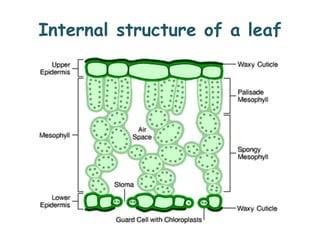
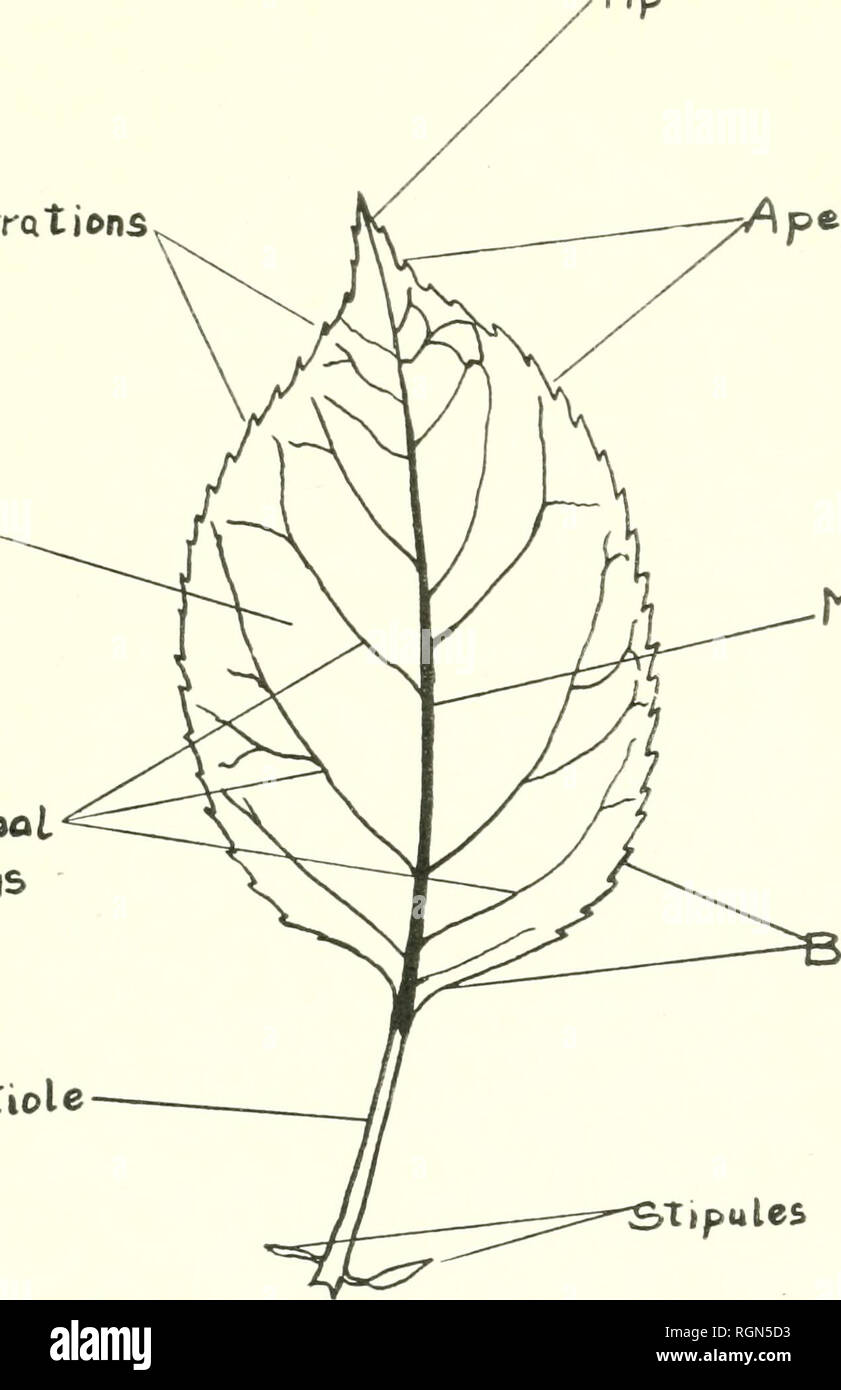





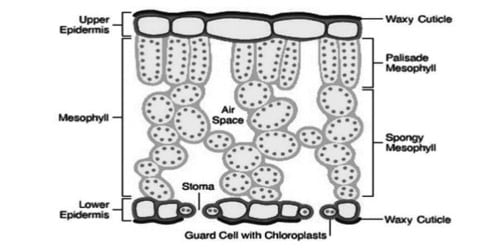
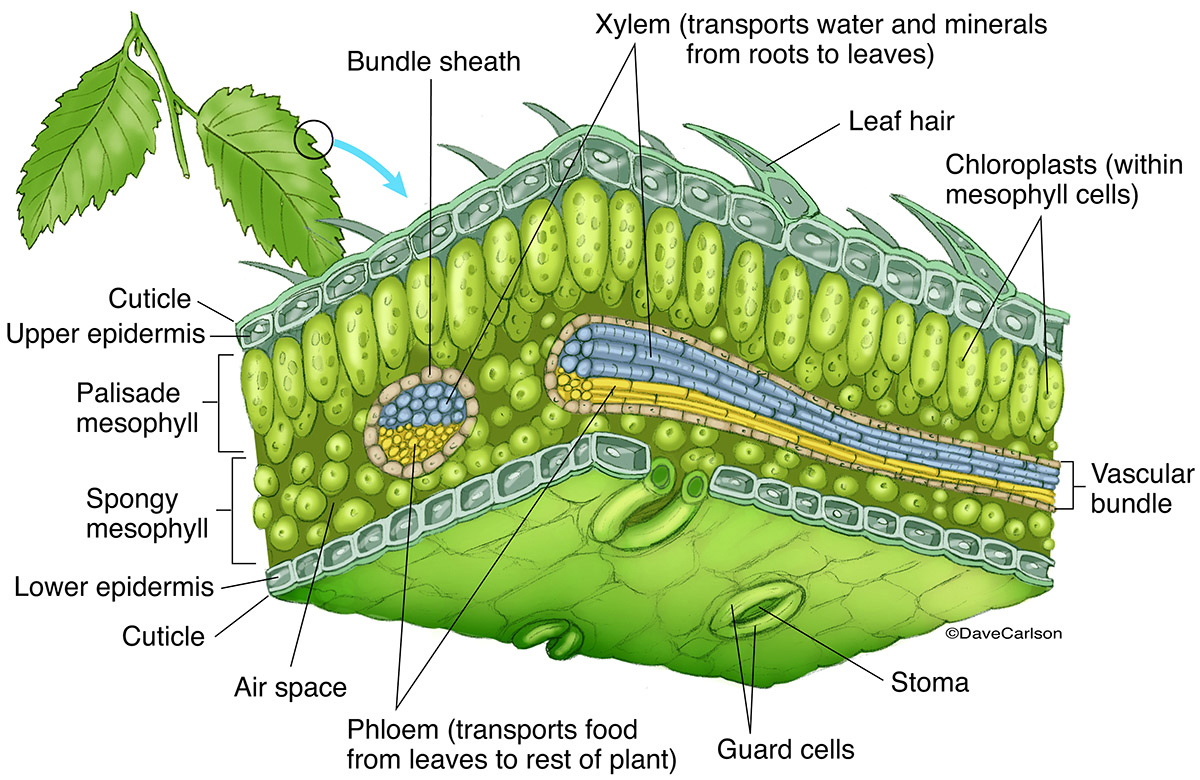





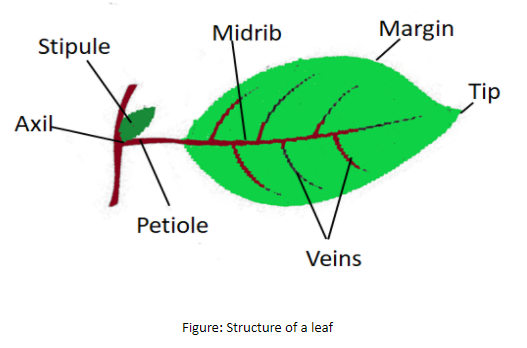
/Leaf_Tissue_Structure-56e6d04c5f9b5854a9f9494e.jpg)
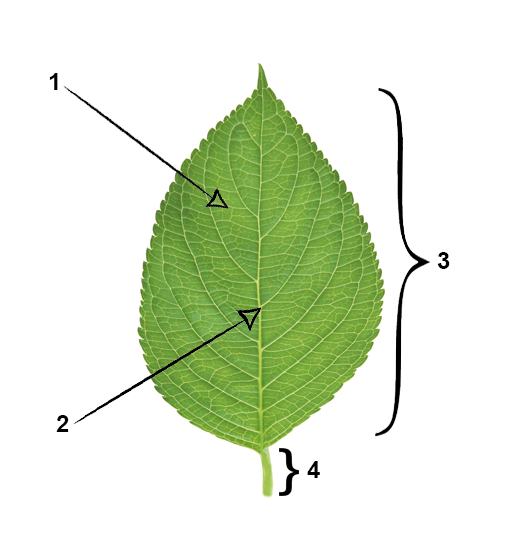
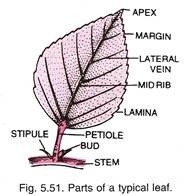







:max_bytes(150000):strip_icc()/leaf_crossection-57bf24a83df78cc16e1f29fd.jpg)

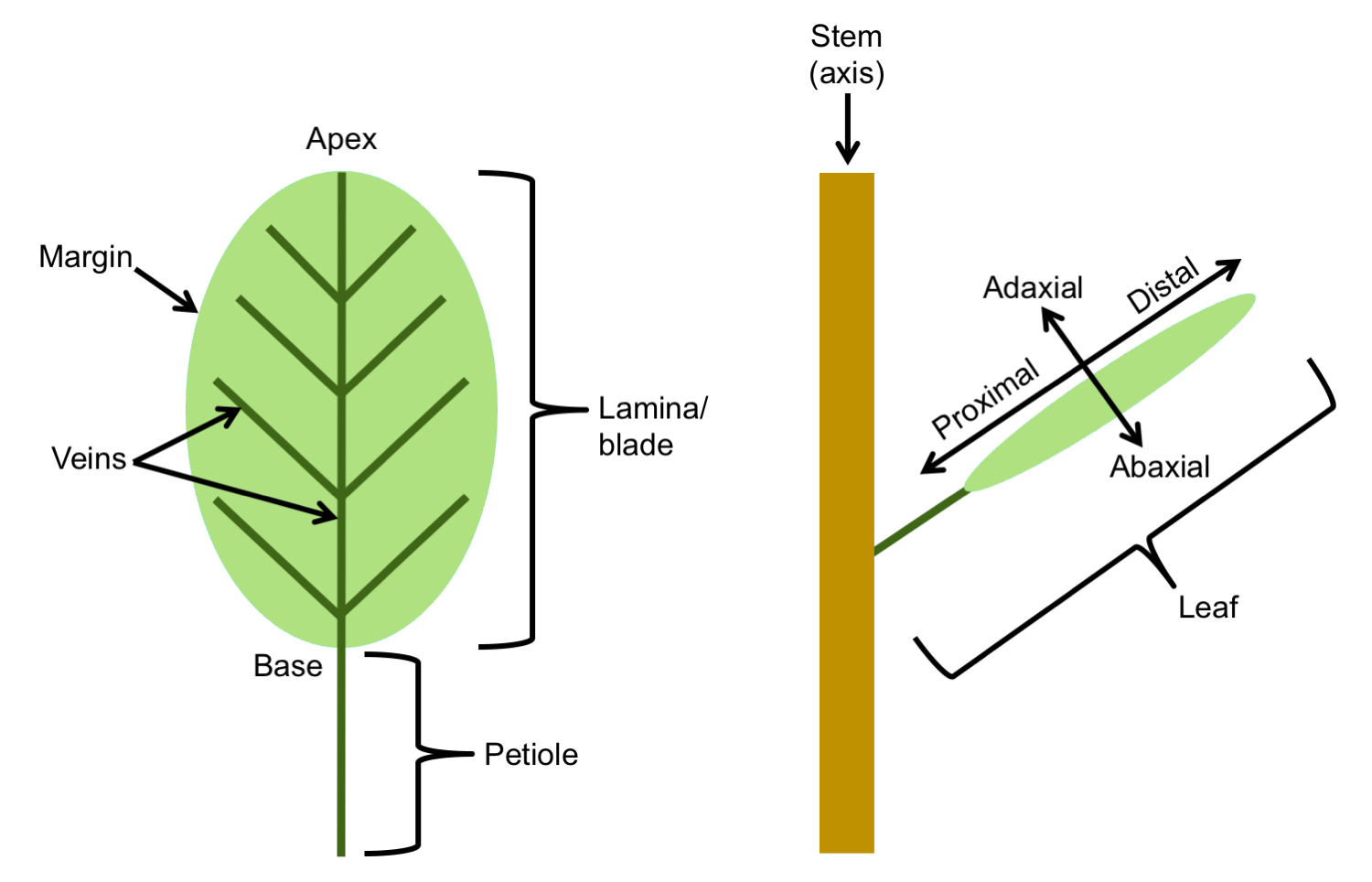

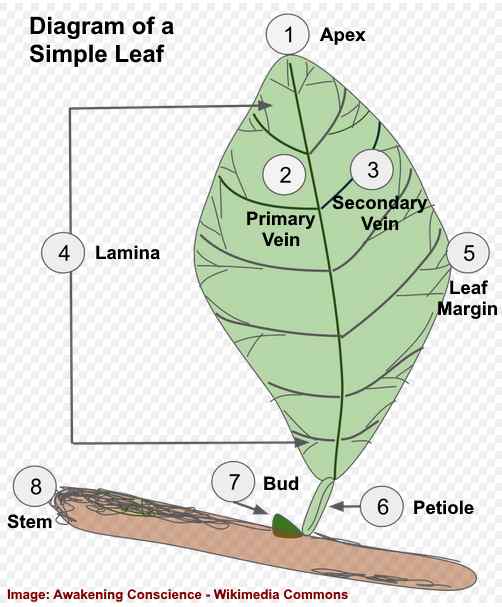





Post a Comment for "41 parts of the leaf labeled"